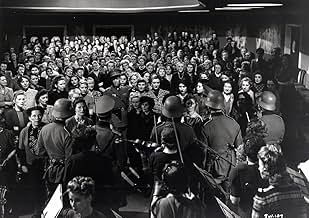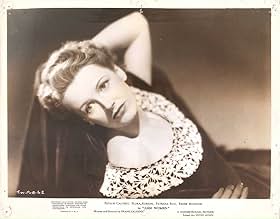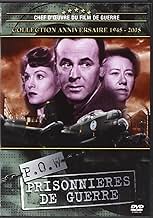IMDb RATING
6.5/10
539
YOUR RATING
Women in a French internment camp conceal downed British airmen from German soldiers, and try to help them escape. Produced by Edward Black. Written and directed by Frank Launder.Women in a French internment camp conceal downed British airmen from German soldiers, and try to help them escape. Produced by Edward Black. Written and directed by Frank Launder.Women in a French internment camp conceal downed British airmen from German soldiers, and try to help them escape. Produced by Edward Black. Written and directed by Frank Launder.
- Director
- Writers
- Stars
Robert Arden
- Dave Kennedy
- (as Rob Arden)
Christiana Forbes
- Frau Holweg
- (as Christina Forbes)
- Director
- Writers
- All cast & crew
- Production, box office & more at IMDbPro
Featured reviews
There are some excellent reviews above so I'll not waste any time explaining what happens. Suffice to say, I'd never heard of this film before and just happened to catch it on Film4 on VE Day 2020, and found it an enjoyable and undemanding way to spend an hour or so. Take it for what it is and it's an easy 10/10.
The setting is a women's internment camp which resembles a very large, posh country house with several halls, plenty of space and some luxury rooms. Three RAF pilots find their way into the camp and the women must hide them before these 3 heroic chaps can make their escape. Will things work out as planned....?
There are definitely not 2,000 women in this place. There are, however, a group of irritating women who deserve to be incarcerated. Phyllis Calvert as "Freda" speaks in a ghastly posh accent for the whole film and is quite annoying. Jean Kent as "Bridie" is the funniest to watch while Renee Houston as "Maude" is far better as a cabaret singer/performer than as a wise-cracking street-girl. Betty Jardine does well as section supervisor "Teresa" but there are no great performances in this story. Patricia Roc as "Rosemary" comes off as the best character but she shouldn't be in the film in the first place. She is caught by the French signalling to German airplanes to blow up an ammunition hold. She's in the wrong goddam prison!
An attempt is made at sentimentalism by having somebody sing "There's no place like home" whilst we pan across several of the women's faces. It's rubbish. Another moment that doesn't work happens when Muriel (Flora Robson) and Clairen (Muriel Aked) are taken away to a German prison camp. I'm afraid that we just don't care! There is no drama. The men have absolutely no presence and come across as slightly wimpish.
The ending is laughably bad. I'm not referring to the plot but to the rendition of "There'll always be an England". However, the film is lightweight fluff that passes the time and it's OK as that.
There are definitely not 2,000 women in this place. There are, however, a group of irritating women who deserve to be incarcerated. Phyllis Calvert as "Freda" speaks in a ghastly posh accent for the whole film and is quite annoying. Jean Kent as "Bridie" is the funniest to watch while Renee Houston as "Maude" is far better as a cabaret singer/performer than as a wise-cracking street-girl. Betty Jardine does well as section supervisor "Teresa" but there are no great performances in this story. Patricia Roc as "Rosemary" comes off as the best character but she shouldn't be in the film in the first place. She is caught by the French signalling to German airplanes to blow up an ammunition hold. She's in the wrong goddam prison!
An attempt is made at sentimentalism by having somebody sing "There's no place like home" whilst we pan across several of the women's faces. It's rubbish. Another moment that doesn't work happens when Muriel (Flora Robson) and Clairen (Muriel Aked) are taken away to a German prison camp. I'm afraid that we just don't care! There is no drama. The men have absolutely no presence and come across as slightly wimpish.
The ending is laughably bad. I'm not referring to the plot but to the rendition of "There'll always be an England". However, the film is lightweight fluff that passes the time and it's OK as that.
10davey-7
The critics were a bit sniffy at the time of its release, but this is one of the jolliest films made during the war. It concerns a group of English women caught in France during World War II and interned in a posh hotel.
It's full of the sort of "There'll always be an England" stiff upper lip stuff that looks so kitch these days, and yet there's also a feeling of release for these women since there are no men around.
Sadly, some RAF men accidentally parachute into the camp and the women have to hide them from the Germans. The men are undercast and a bit dreary, but they wouldn't stand a chance against the cream of British character actresses anyway.
The rest of the film concerns the women's attempts to smuggle the men out of the camp. The plot however is irrelevent. What matters is the way these actresses work without having to compete for billing with any male star.
The film is fun, risque and the best British romp before Tom Jones.
It's full of the sort of "There'll always be an England" stiff upper lip stuff that looks so kitch these days, and yet there's also a feeling of release for these women since there are no men around.
Sadly, some RAF men accidentally parachute into the camp and the women have to hide them from the Germans. The men are undercast and a bit dreary, but they wouldn't stand a chance against the cream of British character actresses anyway.
The rest of the film concerns the women's attempts to smuggle the men out of the camp. The plot however is irrelevent. What matters is the way these actresses work without having to compete for billing with any male star.
The film is fun, risque and the best British romp before Tom Jones.
I recently stumbled upon this film on Channel 4. Thankfully I only missed the first ten minutes as it turned out to be a most enjoyable film.
If you're reading this review then you have most probably seen the movie so a synopsis is not needed.
All I really have to say is that the mainly female cast is absolutely superb. I defy anyone to pick out a single performance that stands out from the rest. Phyllis Calvert, Patricia Roc, Thora Hird..the excellent cast just oozes British actresses who went on to even greater performances.
The only thing that let's this film down are the actors who play the British soldiers. Whilst they are good, I found them maybe a little too old for the parts.
All in all though, it is a splendid film. If a remake were made today, it could boast an amazing cast of todays British talent.
I checked IMDb after watching this film and sadly, most of the cast are with us no more. It is as a tribute to them that I write this little review.
If you're reading this review then you have most probably seen the movie so a synopsis is not needed.
All I really have to say is that the mainly female cast is absolutely superb. I defy anyone to pick out a single performance that stands out from the rest. Phyllis Calvert, Patricia Roc, Thora Hird..the excellent cast just oozes British actresses who went on to even greater performances.
The only thing that let's this film down are the actors who play the British soldiers. Whilst they are good, I found them maybe a little too old for the parts.
All in all though, it is a splendid film. If a remake were made today, it could boast an amazing cast of todays British talent.
I checked IMDb after watching this film and sadly, most of the cast are with us no more. It is as a tribute to them that I write this little review.
All those women are confined in a remarkably luxurious German internment camp without male company. What a waste, as so many of them seem to have film star looks and wardrobes to match. So what better spot for some British airforce chaps to seek refuge? Seriously now folks, those British boys must be helped to escape at once. But it's awfully hot in here don't you think, perhaps I'll just take a bath...
After a slow and rather class-conscious opening, the story develops into a stylish, sometimes funny and often sexy battle of wits against the usual hapless German guards and the occasional informer. Along the way, the camera lingers wistfully on every stockinged thigh and lacy bosom, but somehow everyone manages to keep thinking of England at least some of the time.
A top cast of female leads.
After a slow and rather class-conscious opening, the story develops into a stylish, sometimes funny and often sexy battle of wits against the usual hapless German guards and the occasional informer. Along the way, the camera lingers wistfully on every stockinged thigh and lacy bosom, but somehow everyone manages to keep thinking of England at least some of the time.
A top cast of female leads.
Did you know
- TriviaThis movie received its initial telecasts in Los Angeles, California on Monday, January 15, 1951 on KECA (Channel 7) and in New York City, New York on Sunday, February 18, 1951 on the DuMont Television Network's International Playhouse on WABD (Channel 5).
- Quotes
Mrs. Hadfield: You must be dying for a cup of tea, you poor things.
Freda Thompson: You've got some tea?
Mrs. Hadfield: I exchanged a pair of corsets for a quarter of a pound, last week.
- Alternate versionsAlso known as "One Thousand Women" in a shorter version of the same film which omits the Patricia Roc character story-line.
- ConnectionsFeatured in A Bit of Scarlet (1997)
Details
- Release date
- Country of origin
- Languages
- Also known as
- Prisonnières de guerre
- Filming locations
- Gainsborough Studios, Islington, London, England, UK(studio: made at The Gainsborough Studios, London)
- Production company
- See more company credits at IMDbPro
- Runtime
- 1h 37m(97 min)
- Color
- Aspect ratio
- 1.37 : 1
Contribute to this page
Suggest an edit or add missing content
































